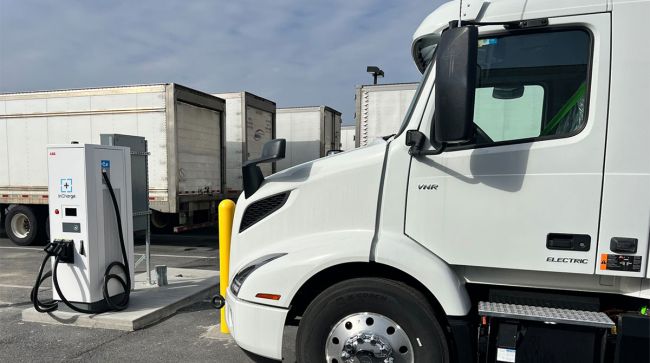Volvo Trucks North America launched a program Aug. 22 it believes will smooth fleet owners’ road to the installation of electric truck charging infrastructure.
The Turnkey Solutions program will procure vendor services, parts and products for electric truck charging, in addition to offering planning help when it comes to incentives, installation and working with utility companies, the truck maker said.
All VTNA customers are eligible for the program. The original equipment manufacturer said it had teamed up with InCharge Energy and Gilbarco Veeder-Root on the program.
“Identifying sources for charging infrastructure can be an overwhelming task for fleet managers, so now all aspects of EV charging are covered through the Turnkey Solutions program,” said Peter Voorhoeve, VTNA president.

The Turnkey Solutions program offers a broad portfolio of chargers and coast-to-coast service coverage by Gilbarco Veeder-Root. (Volvo Trucks North America)
“We simplified the process for customers, allowing them to easily turn to our solution-oriented vendor partners who understand key aspects of the EV charging industry,” Voorhoeve said, adding: “This makes the electromobility transition easier for fleet managers, allowing them to focus on their daily business operations while a dedicated team solves their infrastructure installation and energization.”
VTNA currently offers the VNR Electric Class 8 truck in five configurations: 4×2, 6×2 and 6×4 tractor and 4×2 and 6×4 straight truck. The straight truck options are also available as Class 7 trucks.
BETs are part of a three-pronged approach to decarbonization from VTNA and its parent company, Sweden’s Volvo Group. The other two paths are fuel cell electric vehicles and internal combustion engines with lower carbon fuels.
As part of the ICE path, VTNA is testing five liquefied natural gas Volvo FH trucks with Linde Canada in Alberta in the coming months as part of a one-off North American pilot program, the company said Aug. 21. LNG-powered FH trucks have been available in Europe since 2017.
The FH model is designed for longhaul transport of up to 60 tonnes GCW and have a range of up to 1,000 kilometers or 621 miles. The 13-liter engines will use Westport Fuel Systems’ high-pressure gas-injection fuel system.
Linde’s pilot project is one of a number of collaborations between Westport and Volvo Group. In July, the companies announced a joint venture in which the Swedish company will take a 45% stake.






